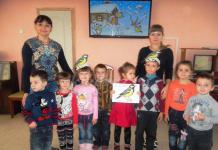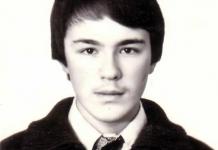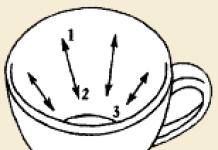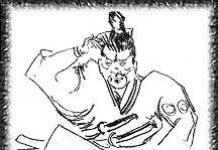The second chapter of the poem “Cloud in Pants” talks about the process of poetic creativity and its purpose, about the poet’s mission in society. Mayakovsky refutes the apparent ease of the poetic craft, writes about how the author carefully considers the creative idea. The poet sees the obvious isolation of many works from living life. He criticizes sentimental and romantic verses, which are far from the true flame of feelings. The poet emphasizes the need for new searches in the field of visual media that can reflect the emotions of every person:
While they are boiling, sawing in rhymes,
Some kind of brew from love and nightingales,
The street writhes, tongueless -
She has nothing to shout or talk about.
V. Mayakovsky shows that the whole society follows poets. He calls on sensible people to break away from creations with sentimental nonsense.
V. Mayakovsky deeply felt not only the rhythm of history, but also the laws of language development. He understood that the new era requires different visual and expressive means. His author's neologisms are an attempt to contribute to the expansion of the language vocabulary base. V. Mayakovsky understood that compared to human history, our life is a grain of sand. We must have time to make our contribution to the development of culture and art. We must hurry to live, boldly joining the fight for our ideals.
In the second chapter of the poem, the city landscape is depicted in sharp, rough strokes (as in the pictures of the artist Lentulov), the central image of which is the image of the crowd.
The poet calls to listen to his preaching speech. He wants to rally around himself even those people who once offended him. The chapter rethinks the biblical story of the crucifixion of Christ: the audiences of Petrograd, Moscow, Odessa, Kyiv are compared with those who shouted on Mount Calvary: “Crucify him!”
The poet seeks to debunk the philosophy of those who fell ill with gold fever like leprosy. The words “dirt” and “gold” are combined in the work within one line, because a society built on the property rights of the strong tramples on the disadvantaged.
V. Mayakovsky proclaims the value of the human personality and believes in the need for social upliftment.
The most important lines in this chapter are the lines about the visionary nature of poetic talent. Incomprehensible to his contemporaries, the poet hopes to reach the hearts of his descendants. Already in 1914-1915, he prophetically sensed the arrival of a new wave of revolutionary changes:
Where the eye of war ends short,
The head of the hungry hordes,
In the crown of thorns of revolutions
The sixteenth year is coming.
And the poet is ready for these revolutionary changes. He sees in them the path to salvation and the triumph of social justice. Like Gorky’s Danko, he wants to take his bloodied soul out of his chest and give it to the people as a banner, as a symbol of the righteous struggle for happiness and freedom.
“A Cloud in Pants” is a revolutionary poem, and not only in theme, but also in the artist’s new, revolutionary attitude to the world, man, and history. Elements of tragedy recede in it before life-affirming pathos. The poet's conflict with reality now finds resolution in a call for active struggle. This is especially clearly seen in the second chapter of the poem. It is in it that one can clearly feel the inevitability of the rapidly approaching crisis of the entire world order and the upcoming revolutionary events:
I,
ridiculed by today's tribe,
how long
obscene joke,
I see time passing through the mountains,
which no one sees.
They are followed by lines that can rightfully be considered key in the entire poem:
Where people's eyes break short,
the head of the hungry hordes,
in the crown of thorns revolutions
the sixteenth year is coming.
The soul of the poet is in his poems, the whole meaning of his deeds and the highest
happiness lies in serving the rebellious people:
And I am his forerunner;
I - where the pain is, everywhere;
on every tear drop
crucified himself on the cross...
Thematically, “A Cloud in Pants” is a poem about the poet’s love, about the sincerity of human relationships, which collides with the lies of the social and moral laws of bourgeois society. But the love drama here becomes only a particular expression of the general social conflict. It sounds again in the capitalist world, the poet is responsible for them, but it sounds differently than before. In unity with people, the poet realizes the strength that allows him to accept the challenge of the bourgeois-petty-bourgeois world:
I don't care if it doesn't
in Homers and Ovids
people like us
I know -
the sun would darken if it saw
our souls are rich in gold!
The poet encourages people not to ask, but to demand happiness here and now:
Tendons and muscles - more than prayers.
Should we beg for the favors of time!
We -
every -
keep it in our hearts
worlds drive belts!
Mayakovsky believes in man and in the future triumph of high human principles. He believes that man is the creator of his own happiness:
To us, the healthy ones,
with a step of a fathom,
you should not listen, but tear them -
their,
sucked by the free application
for every double bed!
Should I humbly ask them:
"Help me!"
Pray for an anthem
about the oratorio!
We ourselves are the creators in the burning hymn -
the noise of the factory and laboratory.
In the second chapter, Mayakovsky attacks poets who in their work preach the philosophy and ethics of bourgeois individualism:
Poets,
soaked in crying and sobbing,
rushed from the street, shedding their hair:
“How can you drink with two of these?
and the young lady,
and love,
and a flower under the dew?
Mayakovsky also shares with those who adhere to anti-democratic ideological teachings that cultivate contempt for the masses and the idea of a superman. In this regard, the image of the “screaming-lipped Zarathustra” appears in the second chapter:
Listen!
Preaches
rushing and groaning,
today screaming-lipped Zarathustra!
We
with a face like a sleepy sheet,
with lips hanging like a chandelier,
We,
convicts of the city - leper colony,
where gold and dirt ulcerated leprosy, -
we are purer than the Venetian blue sky,
washed away by the seas and suns at once!
The second chapter ends with the words:
And when
his arrival
announcing a riot,
go out to the savior -
I tell you
I'll pull out your soul,
I'll trample
so big! —
and I will give the bloody one as a banner.
This is all Mayakovsky, he is always there - “where there is pain, everywhere.” In “A Cloud in Pants” the main theme of all Mayakovsky’s creativity, all of Mayakovsky’s poetry was determined - the theme of revolution. More precisely, the revolutionary element itself, the revolutionary renewal, became the main content, the main character of Mayakovsky’s poems and poems, starting from “The Cloud...” and ending with the poem “At the top of my voice.”
V. Mayakovsky’s poem “A Cloud in Pants”, written in 1914-1915, in content is a work that, in an “Aesopian” manner, promotes the revolutionary struggle against the foundations of bourgeois society - its morality, art, system and ideology. Four parts of the tetraptych are dedicated to this.
The second part stands under the slogan “Down with your art.” In it, bourgeois art is subjected to derogatory criticism, smoothing out the severity and strength of human suffering, which were described with incredible force in the first part. The second part is directed against those poets who “boil some kind of brew out of love and nightingales, whistling in rhymes.” And although these lines have in mind a specific addressee - Igor Severyanin, in general they contain a much more generalized meaning and are directed against the art that varnishes life, smoothing out its glaring contradictions. The poet puts “nihile” above all this, because in his view books are made like this:
the poet came
he opened his lips easily,
and the inspired simpleton immediately began to sing...
But, in fact, he only sees how among poets and writers “a stupid roach of imagination is quietly floundering in the mud of the heart.” A poet who protests against bourgeois morality protests against art that preaches this morality.
The second part of the poem is very important for understanding the aesthetic positions of the young Mayakovsky. The poet expounds his aesthetic credo in a sharp polemic with bourgeois art. He proclaims the struggle for the democratization of poetry. He contrasts the “squealing rhymes” with the image of a “street” that “writhes, tongueless - it has nothing to shout or talk with.” Mayakovsky sees his task as giving the “languageless street” a poetic word, expressing its suffering and thoughts. And even if the vocabulary of this poetry is not “refined”, even if it includes deliberate rudeness and vulgarisms:
… in the mouth
corpses of dead words decompose,
only two live, growing fat -
"bastard"
and something else.
It looks like borscht.
And the street sat down and shouted:
“Let’s go eat!”
All this is the dictionary of the poetry of the “thousands of street people,” whom the poet urges not to dare to “ask for handouts” from poets “soaked in crying and sobbing.” He also orders the “street” “not to listen, but to tear them apart - stuck with a free supplement to every double bed!”, Because these people are “the creators themselves in the burning hymn - the noise of factories and laboratories.”
The “golden-tongued” poet, “whose every word gives birth to a new soul,” affirms “the smallest speck of living dust” as the highest value of the world. Therefore, he preaches not fantasy, not escapism, but life, its earthly values. The true poet, according to Mayakovsky, is not the one who creates the legend of “Faust, an extravaganza of rockets gliding with Mephistopheles in the heavenly parquet,” but the one who, in the “convicts of the leper colony city” (the lowest degree of the fall of man!) sees “golden showers " Thus, poetry, rooted in earthly, rough life, as opposed to the art of “Homer and Ovid,” is, from Mayakovsky’s point of view, democratic in its very essence.
It is in “A Cloud in Pants” that the theme of art is first connected with the theme of revolution. The mission of the poet, in Mayakovsky's interpretation, turns out to be the mission of the prophet. This mission is dramatic, since the lyrical hero, who predicted that “the sixteenth year is coming in the crown of thorns of revolutions” (Mayakovsky, however, was mistaken in his prediction by one year), is nevertheless ridiculed by “today’s time.” But the anticipation of the joy of tomorrow, the keys to which are in the hands of these “people... from the soot in smallpox,” forces the poet to again “lift” himself “to the Calvary of the audience.” And even the advent of the revolution, crowning the sermon of the lyrical hero, will not remove this dramatic stamp from the poet’s face:
And when
his arrival
announcing a riot,
go out to the savior -
I tell you
I'll pull out your soul,
I'll trample
so big! –
and I will give the bloody one as a banner...
This is the rich ideological content of the second part, conveyed in Mayakovsky’s unique, extremely expressive style. This style is created from accented verse, the ability to feel the word, no matter what style of speech it belongs to, and boldly experiment with it. The poet peppers his speech with reduced vocabulary, but in his poetry it sounds relevant and not shocking, because he is a poet of the masses. Mayakovsky achieves the utmost expressiveness of the verse, animating everything that exists in the reality around him: the street that “silently pearled flour,” the words that “live fattening.” That is why his art, in my opinion, will never settle as a dead weight to the bottom of human memory.
The second chapter of the poem “Cloud in Pants” talks about the process of poetic creativity and its purpose, about the poet’s mission in society. Mayakovsky refutes the apparent ease of the poetic craft, writes about how the author carefully considers the creative idea. The poet sees the obvious isolation of many works from living life. He criticizes sentimental and romantic verses, which are far from the true flame of feelings. The poet emphasizes the need for new searches in the field of visual media that can reflect the emotions of every person:
While they are boiling, sawing in rhymes,
Some kind of brew from love and nightingales,
The street writhes, tongueless -
She has nothing to shout or talk about.
V. Mayakovsky shows that the whole society follows poets. He calls on sensible people to break away from creations with sentimental nonsense.
V. Mayakovsky deeply felt not only the rhythm of history, but also the laws of language development. He understood that the new era requires different visual and expressive means. His author's neologisms are an attempt to contribute to the expansion of the language vocabulary base. V. Mayakovsky understood that compared to human history, our life is a grain of sand. We must have time to make our contribution to the development of culture and art. We must hurry to live, boldly joining the fight for our ideals.
In the second chapter of the poem, the city landscape is depicted in sharp, rough strokes (as in the pictures of the artist Lentulov), the central image of which is the image of the crowd.
The poet calls to listen to his preaching speech. He wants to rally around himself even those people who once offended him. The chapter rethinks the biblical story of the crucifixion of Christ: the audiences of Petrograd, Moscow, Odessa, Kyiv are compared with those who shouted on Mount Calvary: “Crucify him!”
The poet seeks to debunk the philosophy of those who fell ill with gold fever like leprosy. The words “dirt” and “gold” are combined in the work within one line, because a society built on the property rights of the strong tramples on the disadvantaged.
V. Mayakovsky proclaims the value of the human personality and believes in the need for social upliftment.
The most important lines in this chapter are the lines about the visionary nature of poetic talent. Incomprehensible to his contemporaries, the poet hopes to reach the hearts of his descendants. Already in 1914–1915, he prophetically sensed the arrival of a new wave of revolutionary changes:
Where the eye of war ends short,
The head of the hungry hordes,
In the crown of thorns of revolutions
The sixteenth year is coming.
And the poet is ready for these revolutionary changes. He sees in them the path to salvation and the triumph of social justice. Like Gorky’s Danko, he wants to take his bloodied soul out of his chest and give it to the people as a banner, as a symbol of the righteous struggle for happiness and freedom.
The idea for the poem “Cloud in Pants” (originally titled “The Thirteenth Apostle”) arose from Mayakovsky in 1914. The poet fell in love with a certain Maria Alexandrovna, a seventeen-year-old beauty, who captivated him not only with her appearance, but also with her intellectual aspiration for everything new, revolutionary. But love turned out to be unhappy. Mayakovsky embodied the bitterness of his experiences in poetry. The poem was completely completed in the summer of 1915. Po-et was not only the author, but also her lyrical hero. The work consisted of an introduction and four parts. Each of them had a certain, so to speak, private idea.
“Down with your love”, “Down with your art”, “Down with your system”, “Down with your religion” - “four cries of four parts” - this is how the essence of these ideas is very correctly and accurately defined by the author himself in the preface to the second edition poems.
At the beginning of the second chapter, the author defines his positions:
Praise me!
In the following lines we detect a certain “nihilism”:
I'm above everything that's done
I bet: “nihil” (nothing).
Everything is denied and destroyed, everything is rebuilt and remade in a new way. The denial continues:
I never want to read anything.
And then - the knowledge of life:
But it turns out -
Before it starts to sing,
They walk for a long time, calloused from fermentation...
Next, the author is in the thick of the crowd:
The street silently poured flour...
And again - returning to a personal topic, the poet sets out his life principles.
In the second chapter, Mayakovsky expresses his protest openly, loudly and boldly. With exceptional clarity and inspiration, it expresses the hero’s determination when, addressing the “thousands of street people” who follow the poets “soaked in crying and sobbing,” he says:
Gentlemen!
Stop!
You are not beggars
You don't dare ask for handouts!
…
To us, the healthy ones,
With a fathom step,
We must not listen, but tear them apart -
Their,
Sucked by a free application
For every double bed!
The poet addressed the working people with a solemn sermon, speaking about their greatness and power:
We
With a face like a sleepy sheet,
With lips hanging like a chandelier
We,
Convicts of the leper colony city,
Where gold and dirt showed leprosy, -
We are purer than the Venetian blue sky,
Washed by the seas and suns at once.
…
I know,
The sun would fade if it saw
Our souls are golden scattered!
Listening carefully to the pulse of life, knowing that the feelings he expressed would not today or tomorrow become the self-consciousness of millions, the poet, through the lips of his lyrical hero, proclaimed:
I,
Laughed at by today's tribe,
How long
A dirty joke
I see time passing through the mountains,
Which no one sees.
…
In the crown of thorns of revolutions
The sixteenth year is coming.
And I am your forerunner...
Mayakovsky recognizes himself as the singer of humanity, oppressed by the existing system, which rises to fight. He calls himself “the scream-lipped Zarathustra.” The poet speaks like a prophet on behalf of people oppressed by the city and the trade of stupid, meaningless labor. He ridicules the sweet, chirping poets who “boil,” “sniff,” rhymes, while the writhing street “has nothing to shout or talk about.” With the sharp edges of hot lines, like bayonets, he storms the entire old order of life.
Mayakovsky speaks loudly and soulfully on behalf of those who hold the “natural belts of the world” in their five. Great love for a person is in every line of the second chapter. Not a single calmly spoken, not a single indifferent phrase. Mayakovsky's verse turned out to be powerful enough to convey the movement of worlds, to capture the subtlest movements of the heart and the dull silence of the Universe.
The second chapter is full of thought, fire, contempt, pain and anticipation of the future.
This foresight of the poet shortens the waiting period by a year. It seems to him that a revolution will break out already in 1916.
As for the artistic features of the second chapter of the poem “Cloud in Pants,” they are presented here very widely. The unusual thing about Mayakovsky’s poetry is that it is very active, and it is simply impossible not to perceive it in any way. We can say that his poems are poems of rallies and slogans. And in the second chapter we find examples of this: “Glorify me!”, “Lords! Stop! You are not beggars, you don’t dare ask for handouts!”
Mayakovsky's innovations are diverse. He completely changes established stereotypes in working on words and speech patterns. For example, the author takes a word and “refreshes” its primary meaning, creating a bright, detailed metaphor based on it. The result of this was such images as “bony cabs”, “plump taxis”.
The world of metaphors simply amazes with its imagination and diversity: “a scattering of souls”, “the eye is cut off”, “I will pull out the soul, trample”, “I burned out the souls...”. The comparisons are striking in their imagery: “a face like a washed-out sheet,” “with lips drooping like a chandelier,” and the poet compares himself to “an obscene anecdote.”
By introducing neologisms, Mayakovsky achieves a memorable figurative characterization of phenomena and events: “unfreeze”, “boil out”, “pedestrian”.
The poet deals with vocabulary in an unusually creative way: he “sifts”, “mixes” words, combining them in the most contrasting combinations. In the poem we will find combinations of “high” and “low” styles. “in the choirs of the Archangel’s choir”, “let’s go eat”, “Faust”, “nail”, “Venetian blue sky”, “hungry hordes”. And sometimes there are deliberately rude, “reduced” images: “coughed up”, “bastard”...
In the second chapter of the poem we will find phrases-images, when literally behind one line there is a whole world, reproduced with amazing accuracy and versatility. For example, this is an image of a city:
Puffing up, stuck across the throat,
Plump taxis and bony cabs..
The rhythmic pattern of the second chapter is unique and very dynamic. Mayakovsky transforms and freely combines traditional poetic meters (iamb, trochee, anapest, etc.) with tonic verse, characteristic of folk poetry, creating a flexible, mobile structure of the verse.
And when -
Still!
coughed up a stampede into the square,
Pushing aside the porch that had stepped on my throat...
The rhythmic diversity and variation of a verse is not an end in itself, but a means of expressing the multifaceted content of the poem.
The features of the rhythmic structure of Mayakovsky’s verse include the complex movement of rhythm, the breakdown of the poetic line, and his famous “ladder”:
Listen!
Preaches
Thrashing and groaning,
Today's scream-lipped Zarasthustra.
There is one known recollection of Mayakovsky’s comrade V. Kamensky. He wrote: “The success of the poem “Cloud in Pants” was so enormous that from that moment he immediately rose to the heights of brilliant mastery. Even the enemies looked at this height with awe and amazement.” I believe that this statement fully reflects the essence of this work, because Mayakovsky, imbued with a premonition of the coming revolution, spoke on behalf of enslaved humanity.
Essay on literature on the topic: Analysis of chapter 2 of V. V. Mayakovsky’s poem “A Cloud in Pants”
Other writings:
- Analysis of the first chapter of V.V. Mayakovsky’s poem “A Cloud in Pants.” “Do you think this is malaria raving?” V. Mayakovsky is one of the best poets of the early twentieth century, a century of profound social changes. The poem “Cloud in Pants” was completed by July 1915. There is a poet in it Read More......
- Vladimir Mayakovsky opened an entire era in the history of Russian and world poetry. His work captured the emergence of a new world, born in the most brutal class battles. The poet acted as an innovative artist who reformed Russian verse and updated the means of poetic language. Mayakovsky's poetic conquests determined the main direction Read More......
- Young Vladimir Mayakovsky came to Russian poetry suffering and alone. And from the very first appearance in print and on the stage, the role of a literary hooligan was imposed on him, and in order not to sink into obscurity, he supported this reputation with daring antics at the evenings. Criticism Read More......
- The poem “Cloud in Pants” was completed by July 1915. At the same time, Mayakovsky met Lilya Brik, to whom he read the poem in its entirety, and immediately asked permission to dedicate his work to her. This is how the name (“To you, Lilya”) appeared on the title of the poem. Read More ......
- Among everything that Mayakovsky created during the five years of his pre-October poetic career, a special place belongs to the poem “A Cloud in Pants,” written in 1914-1915. Every word of the work is a daring challenge to reality, a subversion of the social, moral and aesthetic foundations of the bourgeois system and a call for Read More ......
- Mayakovsky’s poetry is active: “Glorify me!”, “Gentlemen! Stop! You are not beggars, you don’t dare ask for handouts!” He completely changes the established stereotypes in working on the word, updating the established meaning of the word: “bony cabs”, “plump taxis”. The poet handles vocabulary creatively: he “sifts”, Read More ......
- The love conflict in the poem is unusual. The lyrical hero waits for Maria for several hours, this brings him to such a state that he feels like a “wiry hulk” whose “heart is a cold piece of iron”, but who wants to have a “darling”. Nerves to the limit. The lines sound tragic: Read More......
- Reading this poem, one can vividly imagine Mayakovsky walking along the shore of the bay and stamping the lines “Clouds in pants” on the sandy beach in Kuokkala to the rhythm of his powerful steps. Traces of huge boots remain on the wet sand, and immortal poems are born in the poet’s mind. Read More......


























